Sing your heart out: The Ultimate Beginners’ Guide to Korean Karaoke(노래방: Noraebang)
Apr 20, 2023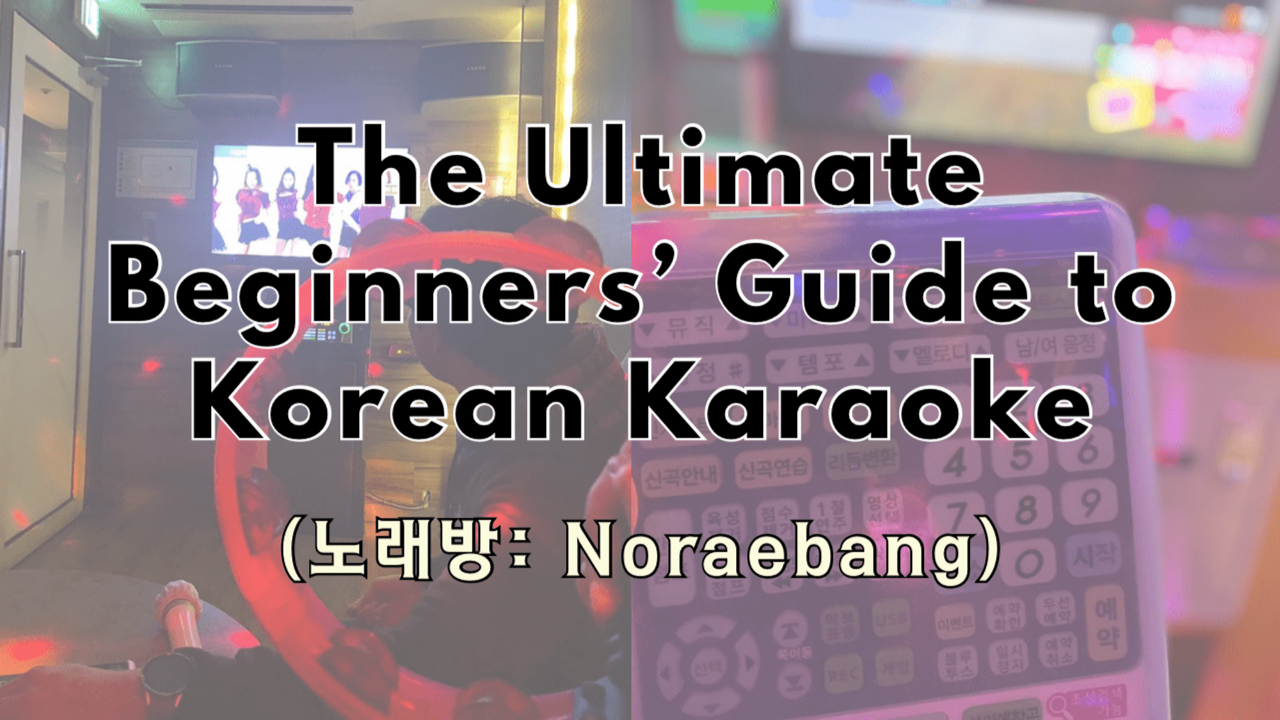
- Author: Elisa Goubeau (France)
- Editor: Good Job Korean Team
👍Contents (Click to navigate instantly)
✅ 노래방:noraebang) so deeply ingrained in Korean culture?
✅ What are the different types of Karaoke? What prices?
✅ Using노래방 remote control like a pro
✅ Song recommendations
I’m from France and I’ve lived in Seoul for an internship from January to March 2023. I’ve explored many different Noraebang places as I spent much of my free time in those boxes belting out any musical genre for fun after work or with friends. Through this contribution, my intention is to guide future Karaoke enthusiasts so they can fully enjoy this entertaining activity.
You might have heard that one of the most beloved pastimes of Korean people is Karaoke a.k.a ‘노래방[noraebang]’. This compound word is made of the two following words 노래 (song) and 방(room). As described by its etymology, it stands for booking a private room and belting out your favorite songs whether it is in public, or not.
It is no surprise to find 노래방[noraebang] and photobooths scattered across every corner of the streets, whatever the district you are exploring. Both make the perfect combination as after singing, you can record those memories with your group of friends at a photobooth (and cute accessories)
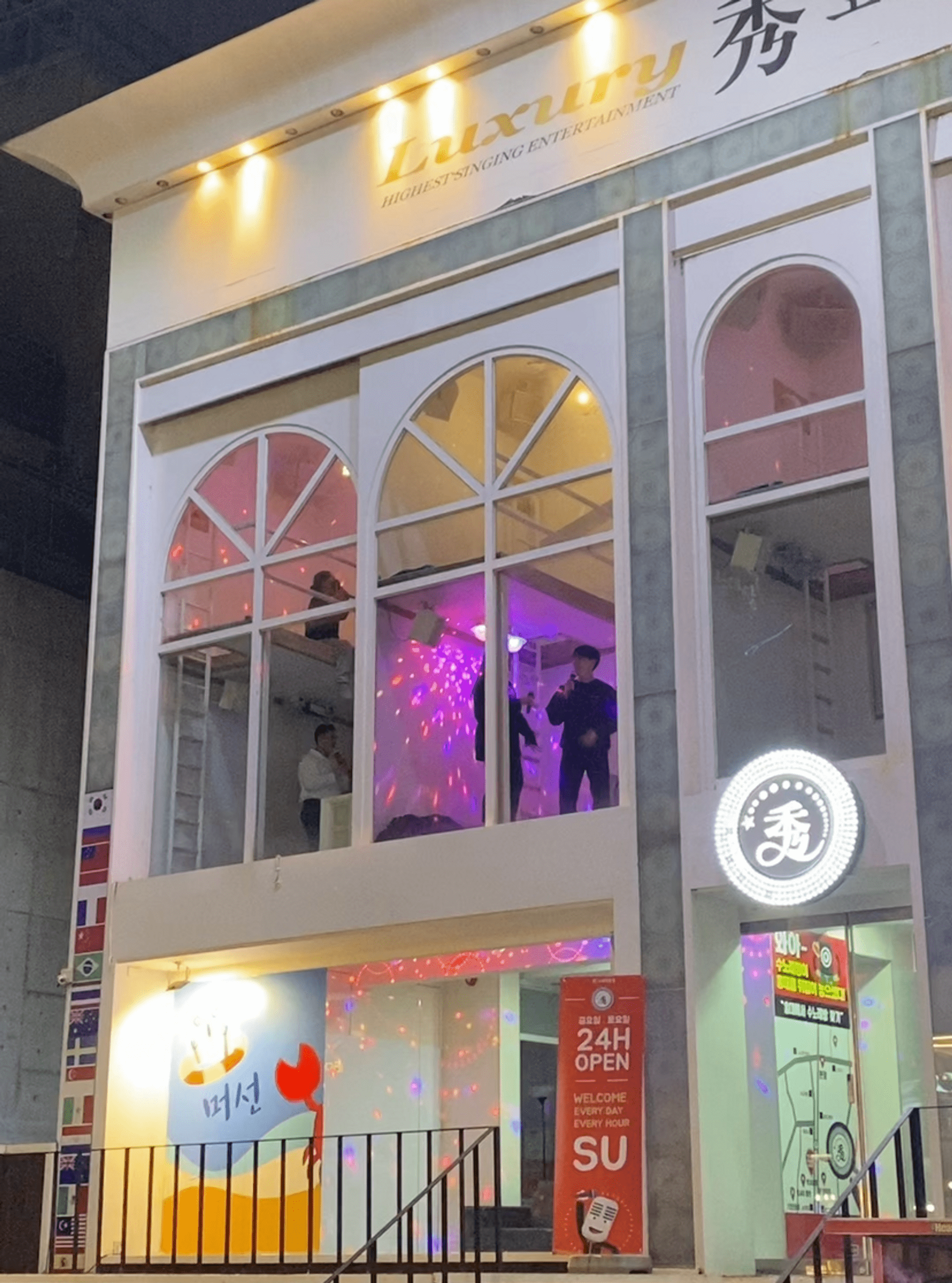 *Su-noraebang (수노래방) in Hongdae is seen in various K-drama scenes (if you want to expose your dancing skills to people walking in the streets but don’t worry they also have normal private singing rooms)
*Su-noraebang (수노래방) in Hongdae is seen in various K-drama scenes (if you want to expose your dancing skills to people walking in the streets but don’t worry they also have normal private singing rooms)
Why is Karaoke (노래방:noraebang) so deeply ingrained in Korean culture?
Why do Korean people always come back in singing boxes even after having lost their voices from singing or shouting too much? More than a simple leisure. While in Western countries, singing in front of other people often occurs for special occasions, in Asian countries, singing has always been a part of daily life. When asking some of my Korean friends why Karaoke was so popular, some of them explained that in Korea, this culture has been reflected since ancient times by the following four-character idiom (expressions called 사자성어: saja-seongeo) :
In Korea, this can be better reflected by the following four-character idiom (사자성어) :
"음주가무[eumju-gamoo]: which can basically be summarized by ‘drinking, singing and dancing’"
There is absolutely no age limit to go 노래방[noraebang] and sing out loud. You don’t need to have the fear of being judged in this country. Students during their free time in between classes (*공강) often go to those insulated private rooms to sing. Whether it is to channel your inner pop star alter-ego and show off your vocal talent, to relieve stress after a long day of work, to cry your heart out after a breakup, to celebrate any event, or to simply enjoy some time to connect with your friends, 노래방[noraebang] is the place to be. Therefore, if you wonder why most Koreans are so good at singing, it is probably due to the fact that they grew up going to 노래방[noraebang].
*공강[gong-gang]: spare time in between classes
More specifically, 노래방[noraebang] is an important part of the office culture during ‘회식[hwae-sik]’. The term 회식[hwae-sik] refers to the situation in which the boss of a company or the managers gather their employees for dinner or after-work drinks to get closer. Such a get-together typically leads to the singing room as a second round (2차) before hopping to another bar.
Beware, compared to common beliefs, it is worth noting that Korean people are not particularly fond of such gatherings as it appears as a chore, an extension of unpaid work and an occasion to be forced to drink. Above all, you still need to follow the company hierarchy even if the context is more convivial. So, do not think about dropping formalities.
What are the different types of Karaoke? What prices?
The first type of Karaoke(noraebang) to introduce is the 코인 노래방[coin noraebang], tiny private rooms which can fit generally 3 people. The first thing to consider is to have cash. If you have large amounts of bills, you can easily exchange them in a machine before entering your assigned private singing room. Some machines might only accept ₩1000 bills. 코인 노래방[coin noraebang] are perfect places for introvert singers. There is absolutely no wrong to go there on your own (to be honest, I went there after work alone and stayed for 2 hours).
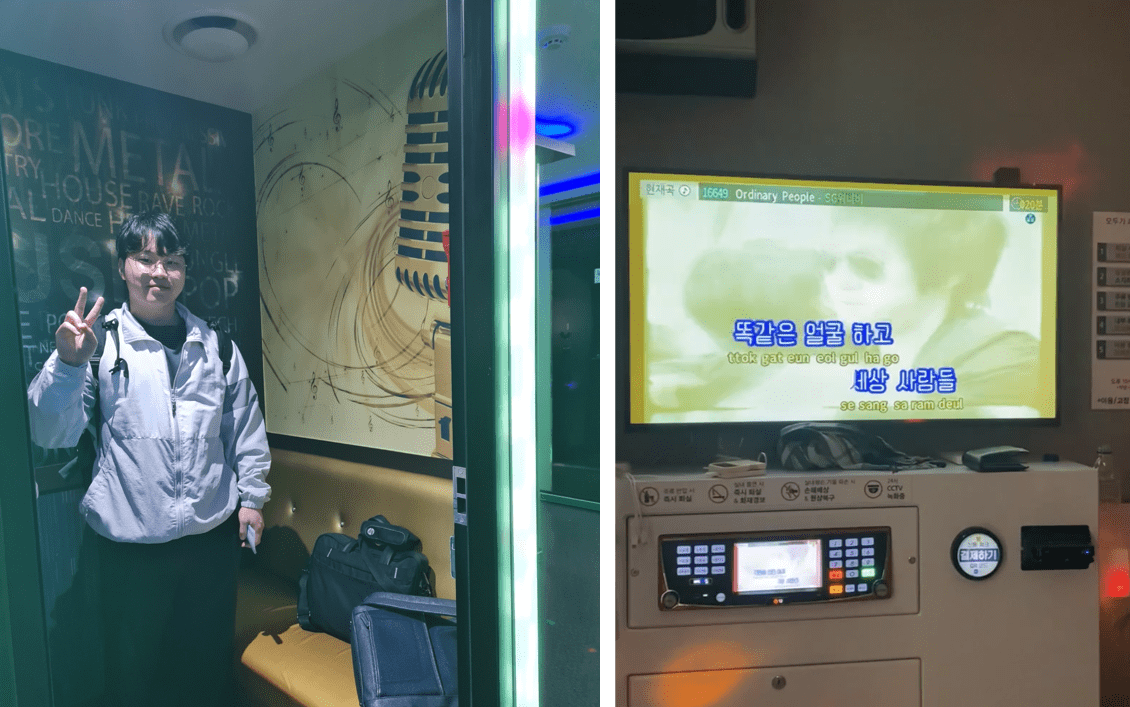 *코인 노래방 (Coin Noraebang box)
*코인 노래방 (Coin Noraebang box)
About 코인 노래방[coin noraebang] prices, you may pay in function of the time spent in minutes (*분), or the number of songs you want to sing (*곡). You can find both systems sometimes. Strategically speaking, if you are the type to take a lot of time to choose the title of a song, I would recommend you the second option. Overall, count around 5-6 dollars for one hour.
*분[bun]: counter for minute
*곡[gok]: counter for song
Here is a few prices indication that slightly (but not hugely) change from one district to another :
→ Around Konkuk University (건국 대학교) :
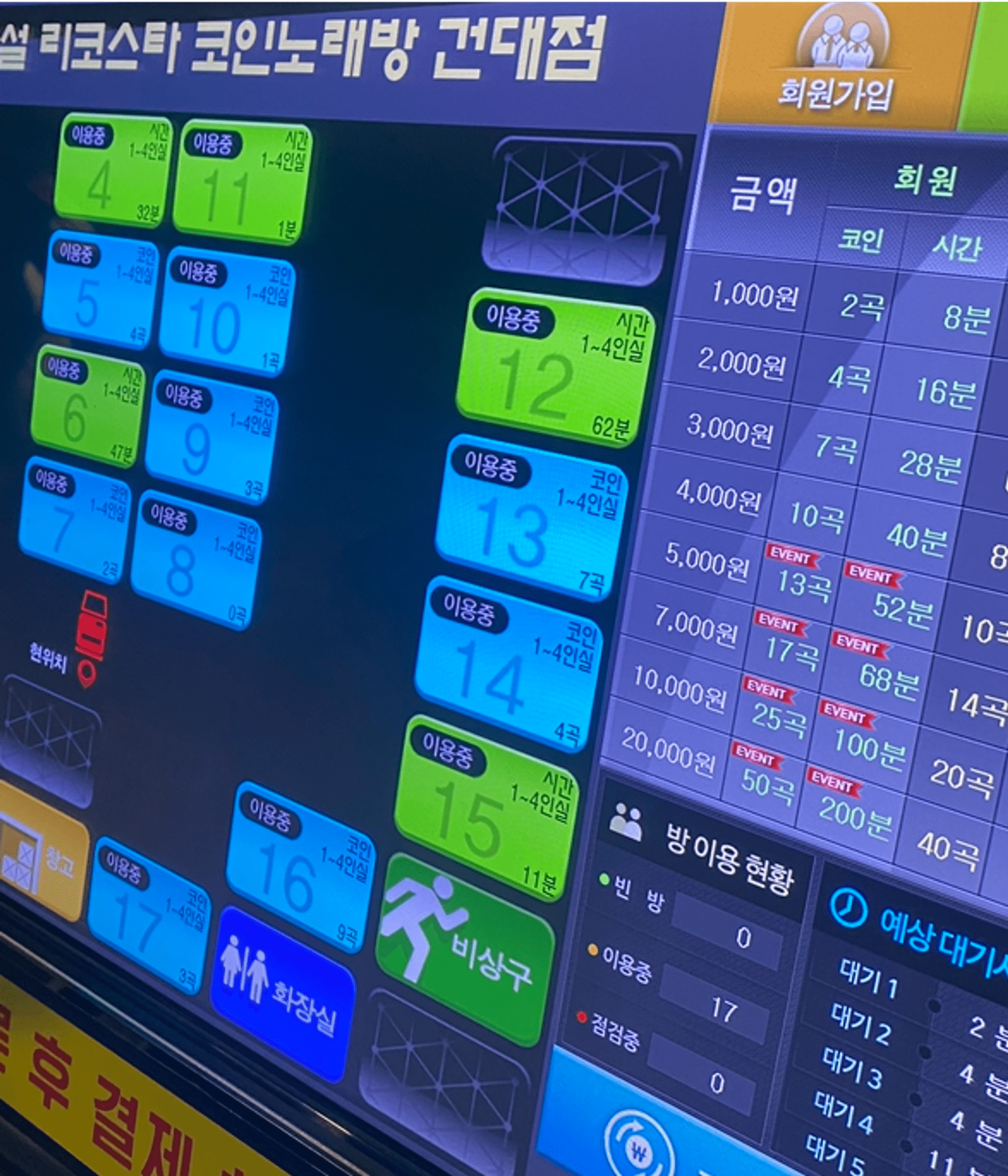
1,000 ₩ ($0.76) = 2 곡(song) / 8 분(min)
2,000 ₩ ($1.50) = 4 곡(song) / 16 분(min)
3,000 ₩ ($2.30) = 7 곡(song) / 28 분(min)
4,000 ₩ ($3.00) = 10 곡(song) / 40 분(min)
5,000 ₩ ($3.80) = 13 곡(song) / 52 분(min)
7,000 ₩ ($5.30) = 17 곡(song) / 68 분(min)
10,000 ₩ ($7.60)= 25 곡(song) / 100 분(min)
20,000 ₩ ($15.20)= 50 곡(song) / 200 분(min)
→ Around Hongdae / 홍익대학교 :
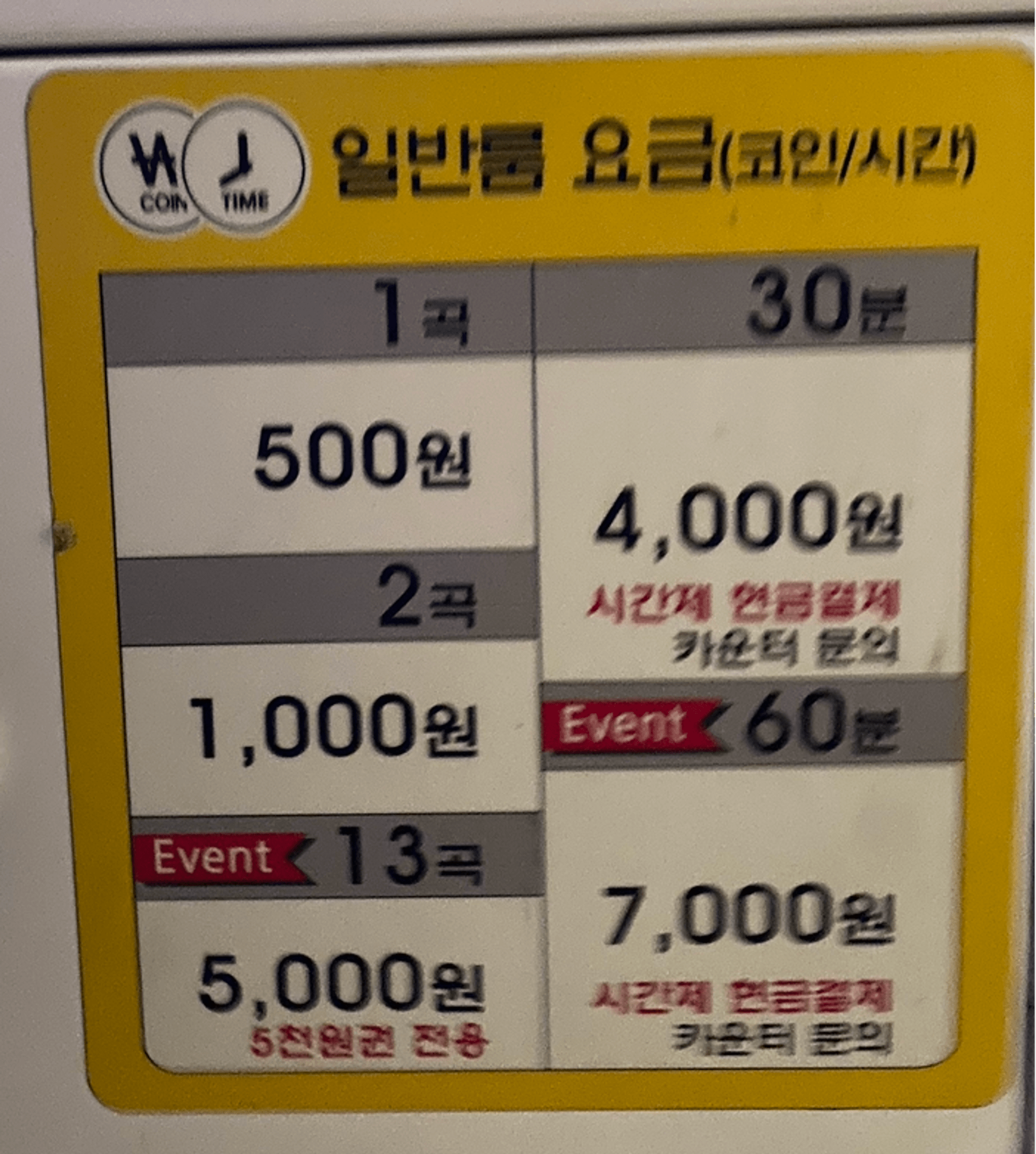
1 곡(song) = 500 ₩ ($0.38)
2 곡(song) = 1 000 ₩ ($0.76)
13 곡(song) = 5 000 ₩ ($3.80)
30 분(min) = 4 000 ₩ ($3.00)
60 분(min) = 7 000 ₩ ($5.30)
→ Around SNU / 서울대학교:
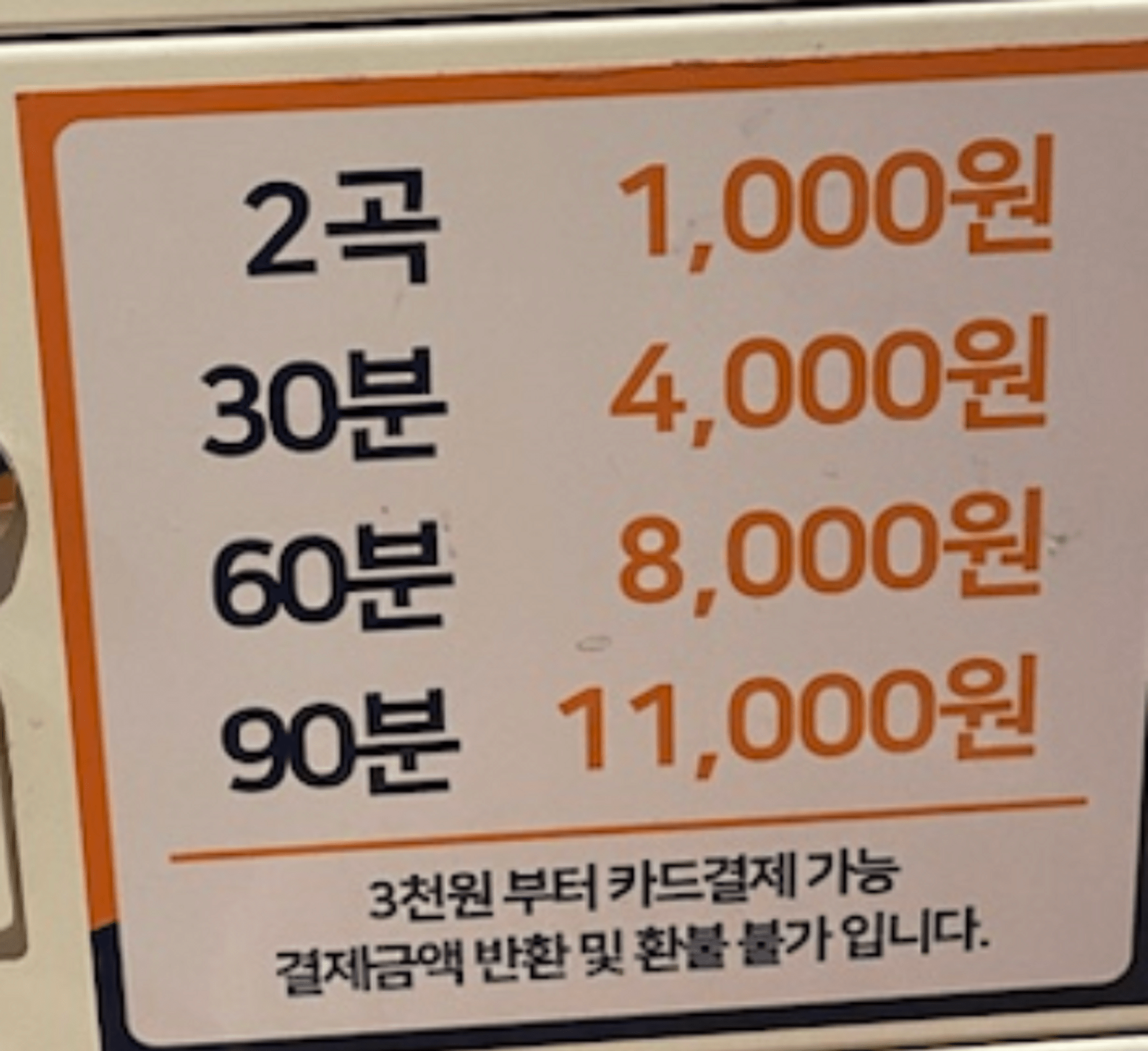
2 곡(song) = 1 000 ₩ ($0.76)
30 분(min) = 4 000 ₩ ($3.00)
60 분(min) = 8 000 ₩ ($6.00)
90 분(min) = 11 000 ₩ ($8.30)
→ Around Gangnam District :
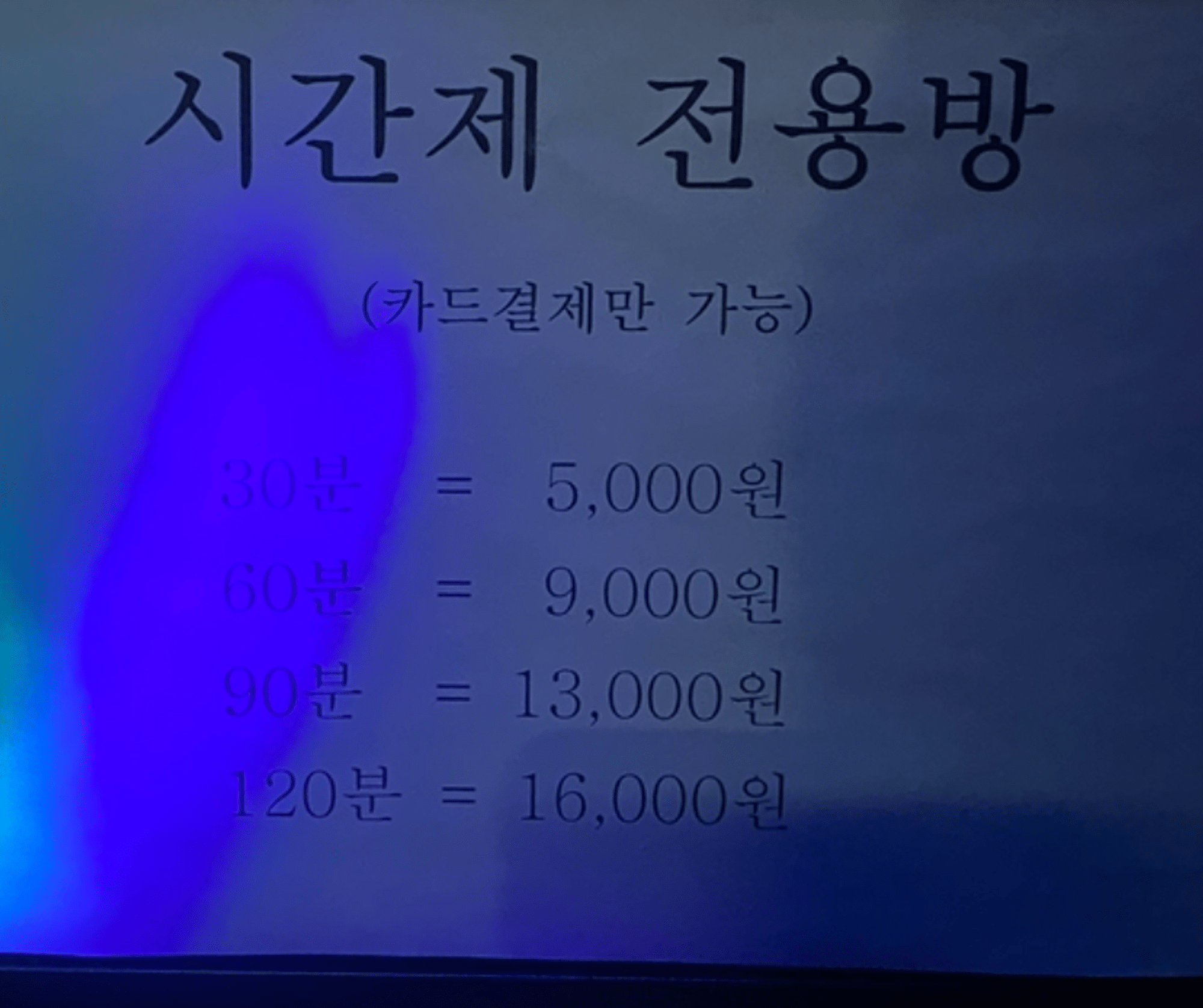
30 분(min) = 5 000 ₩ ($3.80)
60 분(min) = 9 000 ₩ ($6.80)
90 분(min) = 13 000 ₩ ($9.80)
120 분(min) = 16 000 ₩ ($12.10)
The second category is 노래방[noraebang], also called *노래 연습장[norae yeonseupjang]. They are generally charged hourly. Depending on the place, you can eventually buy snacks and drinks including alcoholic beverages (because it is important to hydrate when you sing non-stop for several hours). The range of prices goes from 15 000₩ to 30 000₩ per hour. You will be asked to pay at the entrance first.
*노래 연습장[norae yeonseupjang]: 연습장 means ‘place for practicing’ so 노래 연습장 literally means ‘place for practicing singing’
준코 노래방[junco noraebang] is for instance a place where you can consume alcoholic drinks (extra service) while singing, which is normally not allowed in other establishments. For a room for three people, you can count approximately 25 000 ₩ for one hour (19$).
Most 노래방[noraebang] offers what is called 서비스(service) which is free extra time (unfortunately, not available for 코인 노래방). Therefore, don’t panic if you see the times going up from 20 to 50 minutes, you will not be charged. Little advice, you should go in the afternoon on weekdays to get the best 서비스(service) :)
Tips and tricks: How to impress your friends with the 노래방 remote control and use it like a pro?
What can you expect to find in a Korean 노래방[noraebang]? Inside the room, you will normally find a 노래방 machine and a large TV screen, most often with two microphones (make sure to cover the mic with a cap for hygiene), disco and neon lights, a songbook, a tambourine to hype up your friends’ performance, and the most important…a remote with a lot of Korean words and amazing functionalities such as the possibility of changing the key for women and men, of reading a music sheet, of changing the rhythm…
Want a way to expand your Korean vocabulary? Here are some words that might be useful if you want to show off your language skills in front of your friends (no worries, some of them are Kongligh words):
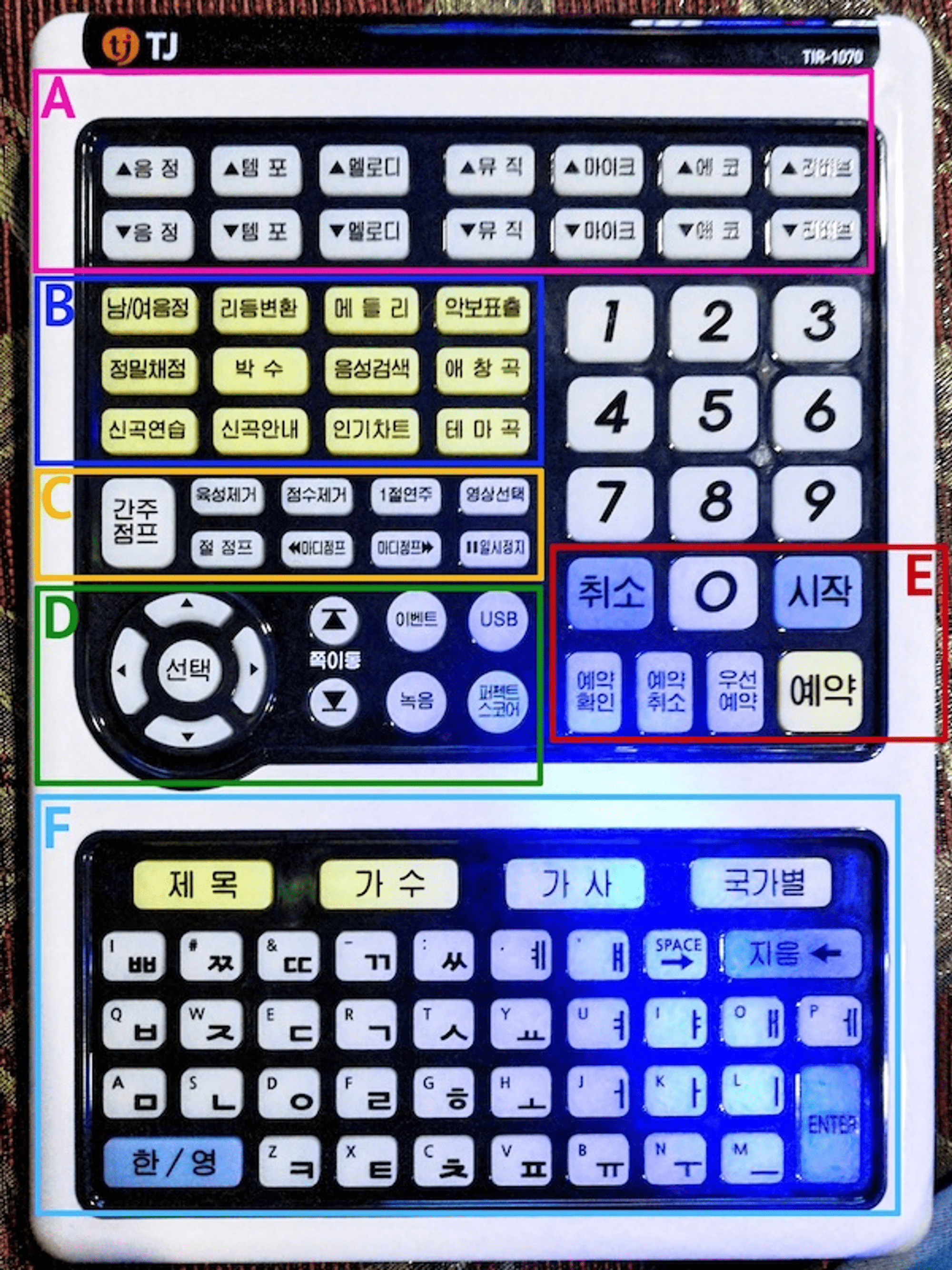 *Guide to 노래방’s remote control
*Guide to 노래방’s remote control
*Note: Do you want to read the words in the remote control? Visit GoodJobKorean.com for a FREE Hangul course!
Part A :
음정 / 템포 / 멜로디: pitch / tempo (to accelerate or slow down) / melody adjustment
뮤직 / 마이크 / 에코 / 리버브: music / microphone / echo / reverb (to adjust the volume)
Part B :
남/여음정: man/woman pitch, 테마곡: songs by theme
리듬변환: rhythm change, 음성검색: voice search, 인기차트: popular charts (when you don’t know what to sing, this button provides you a list per categories, and the list of the most popular norebang songs)
메들리: medley, 박수: applause, 애창곡: favorite songs, 신곡연습: practice of new songs
악보표출: music sheet display, 정밀채점: precise grading, 신곡안내: list of new songs
Part C :
간주 점프: interlude jump (super important to save some time, you can skip the musical interlude if you are in a hurry), 육성제거: voice removal
점수제거: grade removal (because you can get points/grades according to your vocal performance for the most serious singers. People remove it to save time)
1절연주: first verse performance
영상선택: background video choice
절 점프 : verse jump 일시정지 : pause
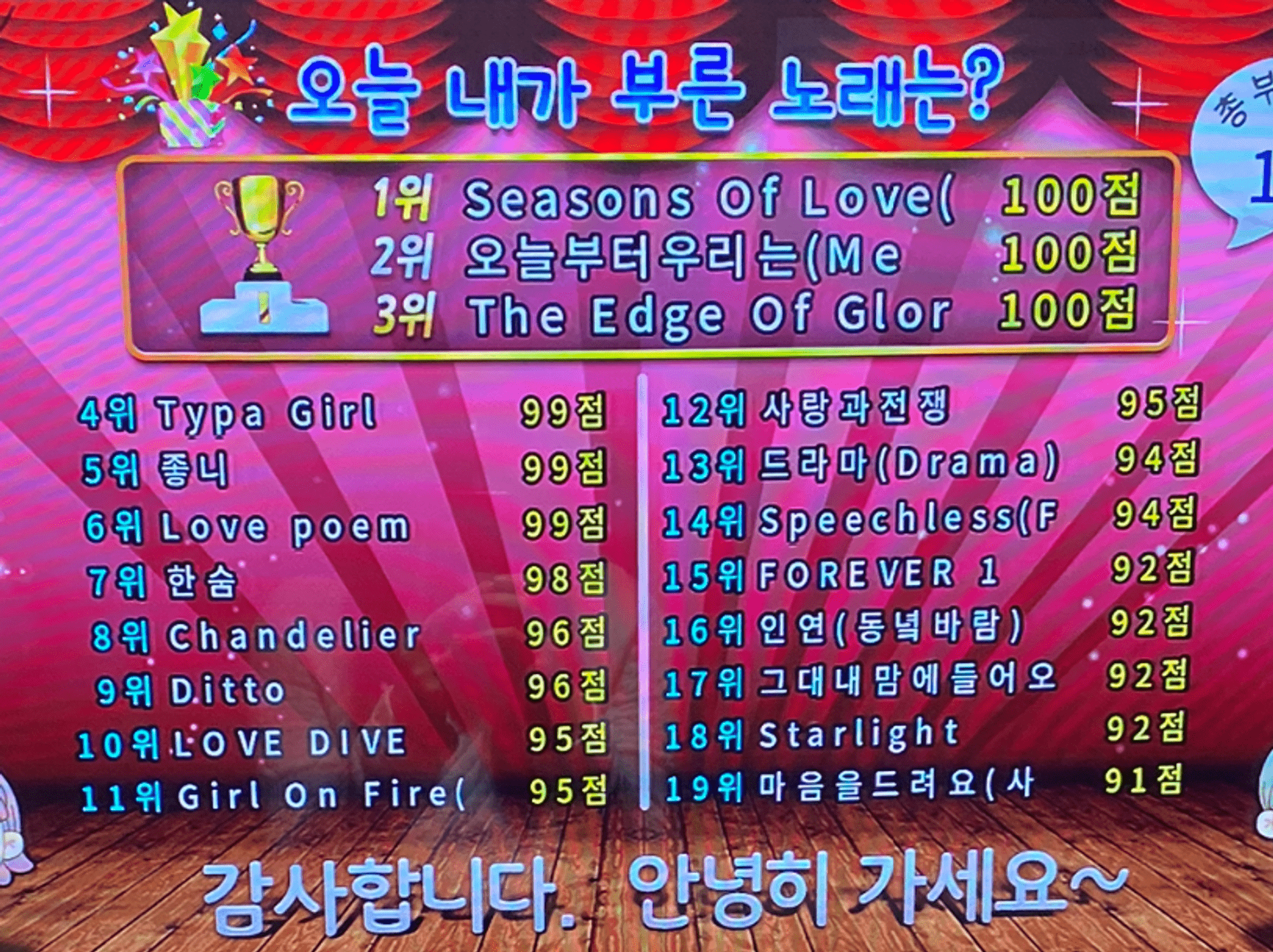 *After the end of your performance, wait for the final score of the songs, it is a ranking but remember that it is never a competition, just a way to be entertained :)
*After the end of your performance, wait for the final score of the songs, it is a ranking but remember that it is never a competition, just a way to be entertained :)
Part D :
선택: choose, 쪽이동 : scroll direction, 녹음: recording, 퍼펙트 스코어: perfect score
Part E: To manage the song list
취소 : cancel, 시작 : start, 예약 확인 : reservation list, 예약 취소 : reservation cancellation
우선 예약 : priority reservation, 예약 : reservation
Part F : To search for a song
제목: title, 가수: artist, 가사: lyric, 한/영: writing system switch (English / Korean)
국가별: country change (Korean, English, Japanese, Vietnamese, Chinese)
QUICK GUIDE :
- Cover the microphones with the caps given at the entrance of the noraebang or available when entering the private singing room assigned.
- Start searching for songs either by title, artist, or number (Part F of the above picture)
- To start right away, you can push the button 시작 (start)
- When your friend is singing, to book the following song, research the song and then hit the button 예약 (reservation) (careful not to remove your buddy’s song to put yours, if they put their soul into the song and you deprive them of this moment, beware)
- To save some time, hit the 간주점프 (skip the non-singing parts) button during the instrumental part of the song.
- If you don’t need a score for your singing performance, hit “점수제거 (remove score)
Keep in mind that the more you will practice, the more you will get used to the remote control :)
Song recommendations (personal favorites and songs recommended by natives) :)
➣For high notes lovers :
- Naul (나얼) - Memory of the Wind (바람 기억)
- IU (아이유) - Good day (좋은 날)
- Ailee(에일리) - I will show you (보여줄게)
- 김아중 - Maria
- So Chan Whee (소찬휘) - Tears (티얼스)
- Davichi (다비치) - 8282
- Younha(윤하) - Event Horizon (사건의 지평선)
➣For ballad lovers :
- Park Hyo Shin (박효신) - 눈의 꽃
- Kim Bum Soo (김범수) - I Miss You (보고싶다)
- Im Jae Bum (임재범) - For You (너를 위해)
- Roy Kim (로이킴) - Only Then (그때 헤어지면 돼)
- IU - Love Poem
- Invitation to Me (나에게로의 초대)
- 마크툽 - 오늘도 빛나는 너에게
- Yoon Jong Shin (윤종신) - Like It (좋니)
- Y Si Fuera Ella - Shinee
- G-Dragon - Untitled, 2014
- 이선희 - 인연
- 자우림 - 스물다섯, 스물하나
➣For rock enthusiasts and trot lovers :
- Cherry Filter (체리필터) - Sweet Little Kitty (낭만 고양이)
- flower(플라워) - 애정 표현
- Shin Hae Chul (신해철) - To you (그대에게)
- Day6 - 한 페이지가 될 수 있게
- Park Sang Cheol (박상철) - No Matter What (무조건 )
- Hong Jin Young(홍진영) - Love Battery (사랑의 배터리)
- Kim Yeonja (김연자) - Amor Fati (아모르 파티)
➣For Pop and K-pop fans:
- HyunA(현아) - Bubble Pop
- H.O.T - Candy
- Baek Jiyoung feat. Taecyeon(백지영 feat. 택연) - 내 귀에 캔디
- IVE(아이브) - Afterlike
- PSY(싸이) - New Face
- Blackpink - Boombayah / Playing with Fire
- Big Bang - Bang Bang Bang / Fantastic Baby
- 김세정 - 사랑인가 봐
- Busker Busker(버스커 버스커) - Cherry Blossom Ending
- Lee Mujin(이무진) - Traffic Light
- GFRIEND(여자친구) - Me Gustas Tu (오늘부터 우리는)
- Girls’ Generation(소녀시대) - 다시 만난 세계 / Gee
- Beast(비스트) - Fiction
- New Jeans(뉴진스) - Ditto / Hype Boy
So, on which team are you? Sad love ballads? Dynamic K-pop dance songs? Every musical tastes are welcome, the importance is to have fun and enjoy a good time :)
So now, what are you waiting for? Do not hesitate to experience one of the most entertaining Korean activities! Besides, as Korean learners, who would not enjoy some 한글 practice in a fun and musical way?
- Author: Elisa Goubeau (France)
- Editor: Good Job Korean Team


